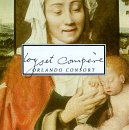| All Artists: Loyset Compère, Orlando Consort Title: Loyset Compère Members Wishing: 1 Total Copies: 0 Label: Metronome Release Date: 8/23/1994 Genres: Special Interest, Classical Styles: Opera & Classical Vocal, Historical Periods, Early Music Number of Discs: 1 SwapaCD Credits: 1 UPC: 750582940422 |
Search - Loyset Compère, Orlando Consort :: Loyset Compère
 | Loyset Compère, Orlando Consort Loyset Compère Genres: Special Interest, Classical
|
Larger Image |
CD Details |
CD ReviewsAnother Great Composer? Giordano Bruno | Wherever I am, I am. | 06/19/2008 (5 out of 5 stars) "The Orlando Consort could probably sing the Manchester phone book and make it musically satisfying. Let's hope that, unlike the Beatles, these four young Brits never break up. I say "young" as a formality; they've been singing together since 1988, when they first assembled on invitation from the British broadcast medium. It's their togetherness that makes them so superb. In the rhythmic thickets of Renaissance polyphony, they move with utter confidence that, however far their individual lines stray from each other, they will re-gather at the cadences with perfect tuning and unity of phrasing. Their four voices are as balanced and blended as the four strings of a single cello. They have no peers, but if Queen Liz is musically savvy she'll elevate them to the peerage immediately.
A CD of Loyset Compere sung by the Orlandos is as sure fire a delight as dinner in a French country inn. Loyset Compere (1445-1518) was another of the great Franco-Flemish singer-composers - along with Josquin, Mouton, Brumel, and others - who spread out across Europe in the 15th Century and instructed the continent in the subtleties of polyphony. "Little Louie the Godfather" (translating his soubriquet name literally) was born somewhere in Hainault, studied in Paris, and spent his most productive years in Milan in the service of Galeazzo Maria Sforza, the fearsome soldier. After Sforza's assassination, Loyset worked for Charles VIII, whom he accompanied on his invasion of Italy in 1494. Loyset's later years were spent in secure and lucrative administrative posts in the churches of Cambrai and St. Quentin. The Latin motets and the Christmas mass recorded on this CD are masterful examples of the international style of the Franco-Flemish musical mafia. One has to wonder what was in the water or the food supply of Belgium in the 15th Century, that it produced so many unrivaled musicians, most of whom lived into their eighties and nineties! Compere translates as 'godfather', but in the dialect of the 15th Century, it could also have meant 'the gossiper.' The four chansons in French and two in Italian on this CD support that interpretation. They are impertinent, witty, almost scurrilous 'love' songs set with the most elegant grace. Loyset was a pioneer in the growing popularity of such 'Parisian' songs, utterly secular and unexpected in the midst of so much sacred polyphony. Here's a sample in the original Renaissance French: Alons fere nos barbes, alons gentil galans, la barbiere les moglie souvent deux a la foix, quant son mari revient de fere sa besogne, chi luy font vigle come, disant coment va, coment fet vostre feme, fet elle cela? Et ou la trouveroye la femme au petit con, dondon, trouver ne la sauroye, et celle de Paris disent qu'il ont petit, par lieu quoi bousteroye, ung chariot branslant, dedens, et ma lance qui ploye. Suffice it to say that, if I translated this song, amazon wouldn't post my review, but it concerns the special services offered by the barber's wife. The full text is translated in the booklet with the CD. The blend of jolly secular songs with serene sacred motets makes this performance especially enjoyable to hear again and again. This is an outstanding CD from the premiere vocal consort of all Early Music." |

 Track Listings (10) - Disc #1
Track Listings (10) - Disc #1